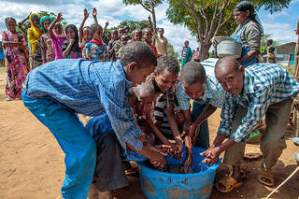
The US State Department is in charge of processing international adoptions to and from the US. The person at the head of this section at the State Department is Susan Jacobs, Special Advisor for Children’s Issues. Last week, in honor of National Adoption Month, the State Department held a press conference with Ms. Jacobs to discuss the status of international adoptions. When Ambassador Jacobs talks, those of us who care about international adoption should listen since she is about as high up in the US government as it gets when talking about international adoption. I’ve covered the highlights below.
Ethiopian Adoptions
Ms. Jacobs has recently returned from a trip to Ethiopia. Her comments in the press conference were the standard boiler plate: we are working closely with the Ethiopian government to make sure that adoptions are transparent and honest. I had hoped for more detail, but I suppose it’s good news that there is not anything earth shattering to report.
US pullout from Guatemalan adoptions
She did have some interesting insight into the US withdrawing from the international adoption pilot program in Guatemala. She said: “In terms of the pilot project, every time we asked for details about it, there weren’t any. So it turned out there really wasn’t a pilot project to which – in which we could participate. And in looking at the procedures and regulations that had been put in place, not very much had changed since adoptions had been shut down. So we are trying to work with the Guatemalan Government to help them set in place proper regulations and procedures, and at the same time, close the cases that are in the pipeline. There are hundreds of cases that need to be resolved, so we’ve asked them to focus on that.”
Haiti’s earthquake orphans
She also addressed an interesting situation that resulted from the evacuation of children from Haiti to adoptive families in the US immediately after the earthquake. I imagine we all have heard that several children were evacuated that did not meet the strict criteria set up by the State Department. I have never found the exact number of kids that fit into this category until today—turns out there were twelve. Considering the chaotic conditions people were working in and the high state of emotions, twelve seems like a relatively small number. About these twelve cases, Ambassador Jacobs said:
“During the crisis, 12 children were also brought from Haiti to the United States who had not previously been matched with families here. … A delegation from [the US government] traveled to Haiti about four weeks ago to work with the Haitian Government to resolve these cases. …We sent a team down there to meet with the Haitian officials and with the parents of these children, and we expect that these cases will be resolved very soon. …
QUESTION: Resolved in what way? Will the children go back?
AMBASSADOR JACOBS: Resolved in whether the parents want to relinquish the children so that they can be adopted in the United States or —
QUESTION: So the parents have been identified?
AMBASSADOR JACOBS: Oh, yes. I mean, and the children have – were in contact with their parents throughout this process. …They’re in a very safe, loving atmosphere, …but it’s up to the parents to decide whether or not they want to relinquish these children for adoption. And if they don’t, we will send back the children whose parents want them returned.”
Russian adoptions
Although not necessarily enlightening, I think it’s useful to hear what she had to say about international adoptions from Russia, in light of the negative publicity surrounding these adoptions in the last year. Note that she says that they expect an agreement between Russia and the US on international adoption before the end of the year.
QUESTION: Yeah, hi. Kirit Radia with ABC News. Forgive me if I missed you saying this earlier, but could you bring us up to speed on the negotiations with the Russians over the adoption programs there?
AMBASSADOR JACOBS: You – I didn’t say anything about it. (Laughter.)
QUESTION: If you could please bring us up to speed on where that is?
AMBASSADOR JACOBS: The negotiations proceed and we think they’re going very well, and we hope to have an agreement before the end of the year.
QUESTION: And what can you say about the status of their demand on the ability to prosecute Americans and —
AMBASSADOR JACOBS: I really can’t say anything about it because we’re still negotiating.
QUESTION: Well, what’s the status right now of adoptions from Russia?
AMBASSADOR JACOBS: In Russia, they’re proceeding.
QUESTION: Okay. They – so they —
AMBASSADOR JACOBS: They never stopped processing cases from the United States.
QUESTION: So then why – what are the negotiations, then, about changing —
AMBASSADOR JACOBS: The negotiations involve changes that they would like to see in our procedures and changes that we would like to see in theirs.
QUESTION: But during the time of these negotiations, children are still coming over from Russia.
AMBASSADOR JACOBS: Yes, they are.
You can read the full transcript or watch a video.
Image credit: UNICEF Ethiopia

Great info. keep it coming
Thank you for this. You are my #1 source of info on adoption now. Thanks for keeping me up. I was so sad to hear about Guatmala. I have a son from there and wanted to adopt again.